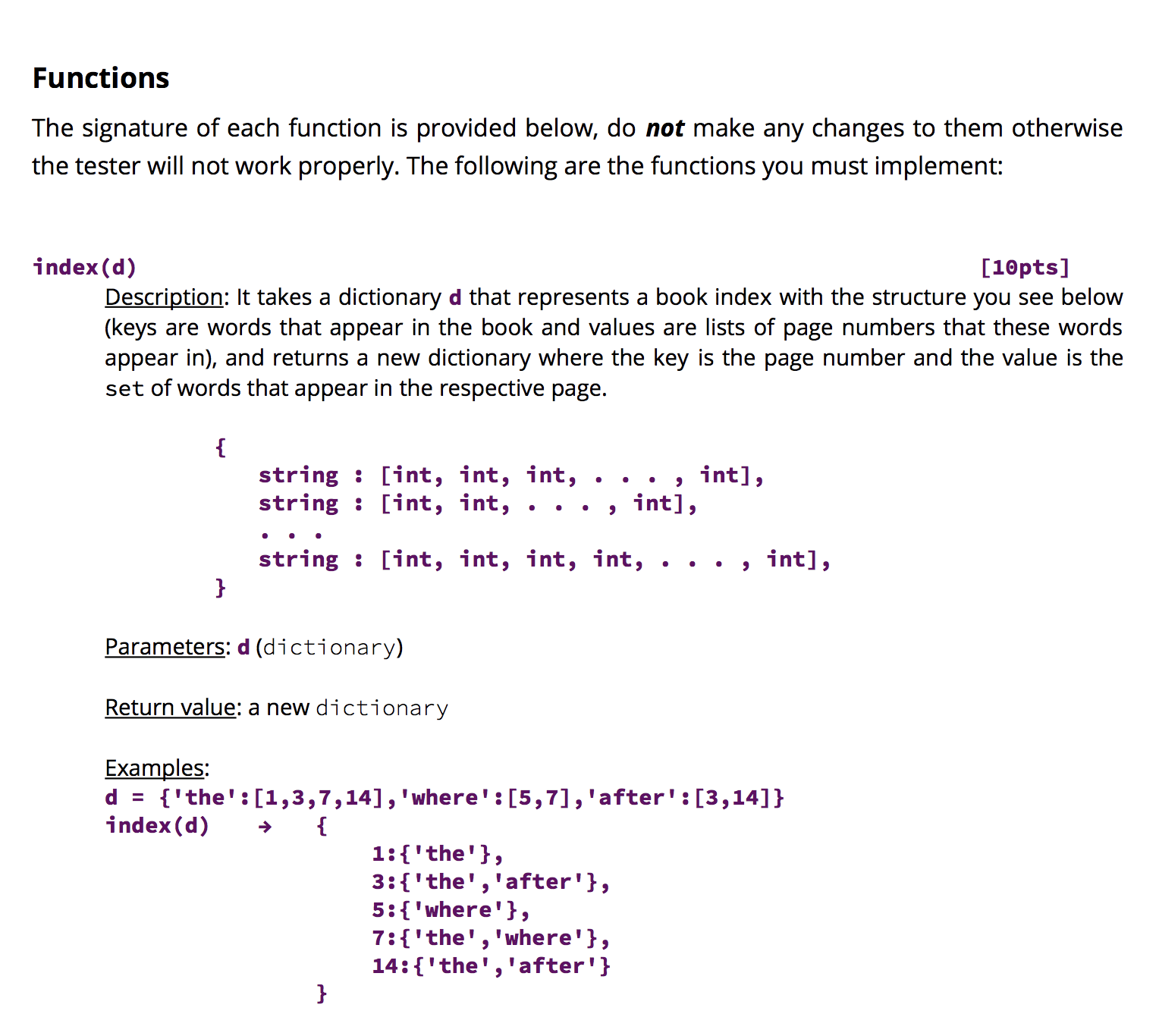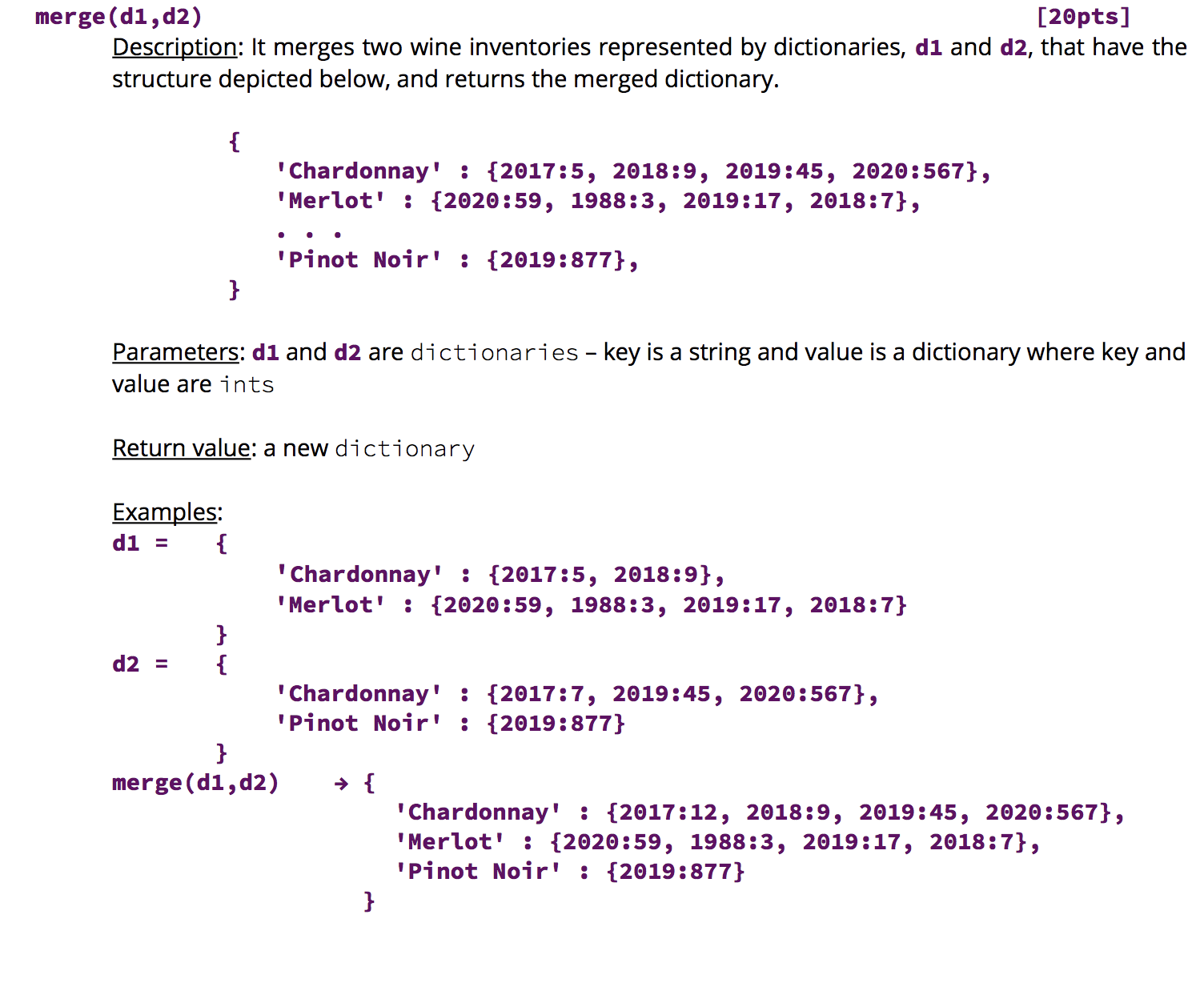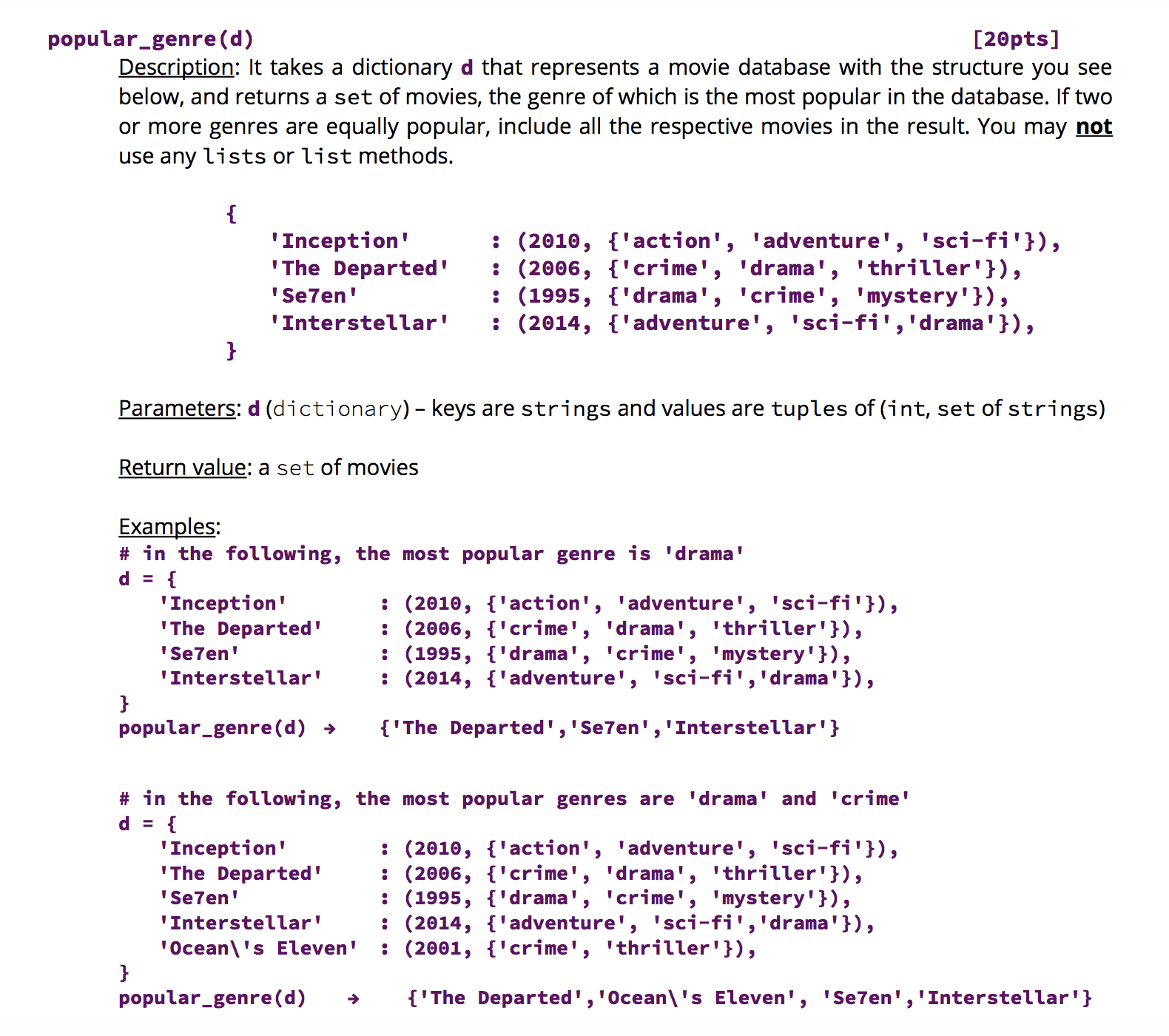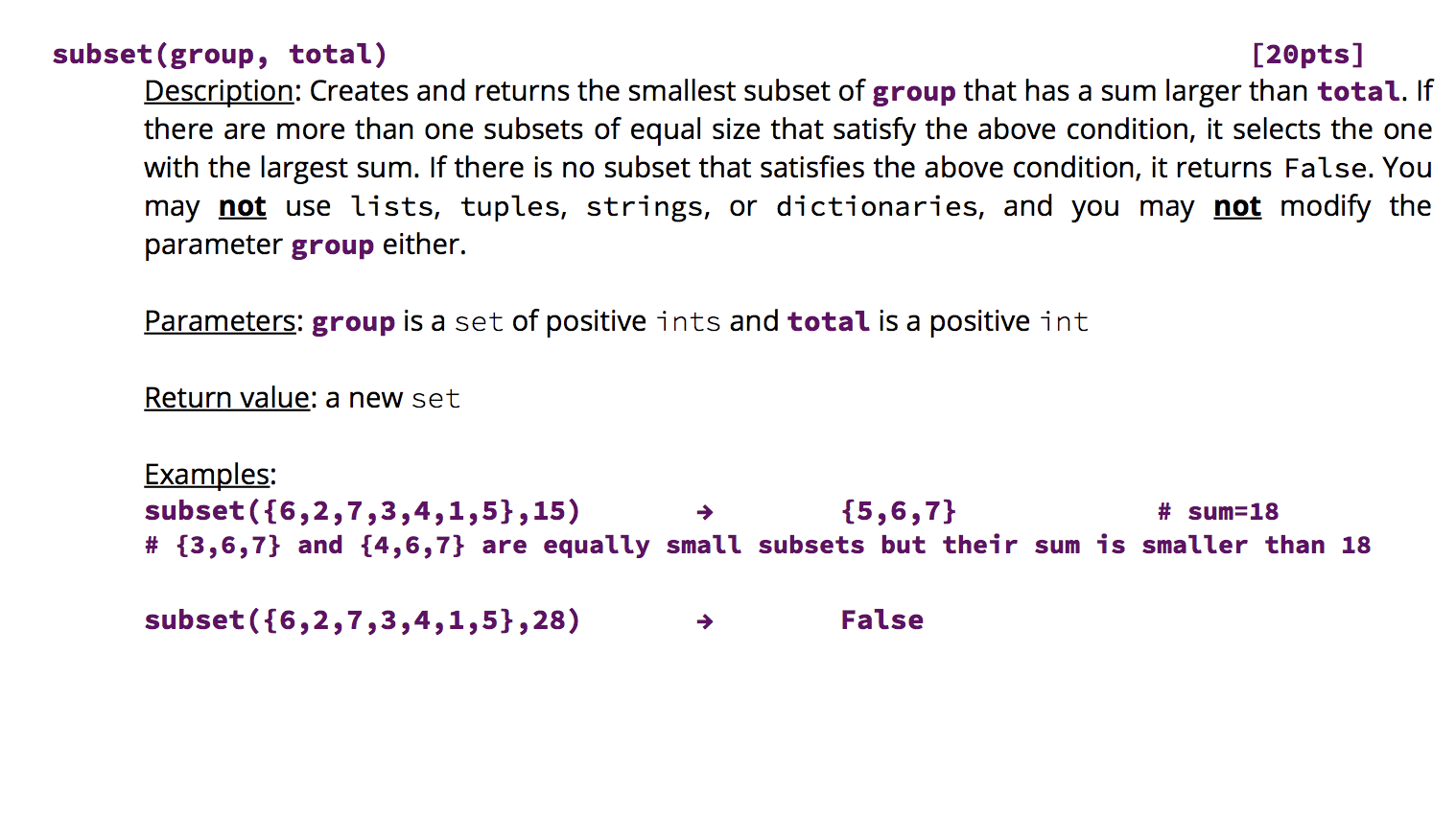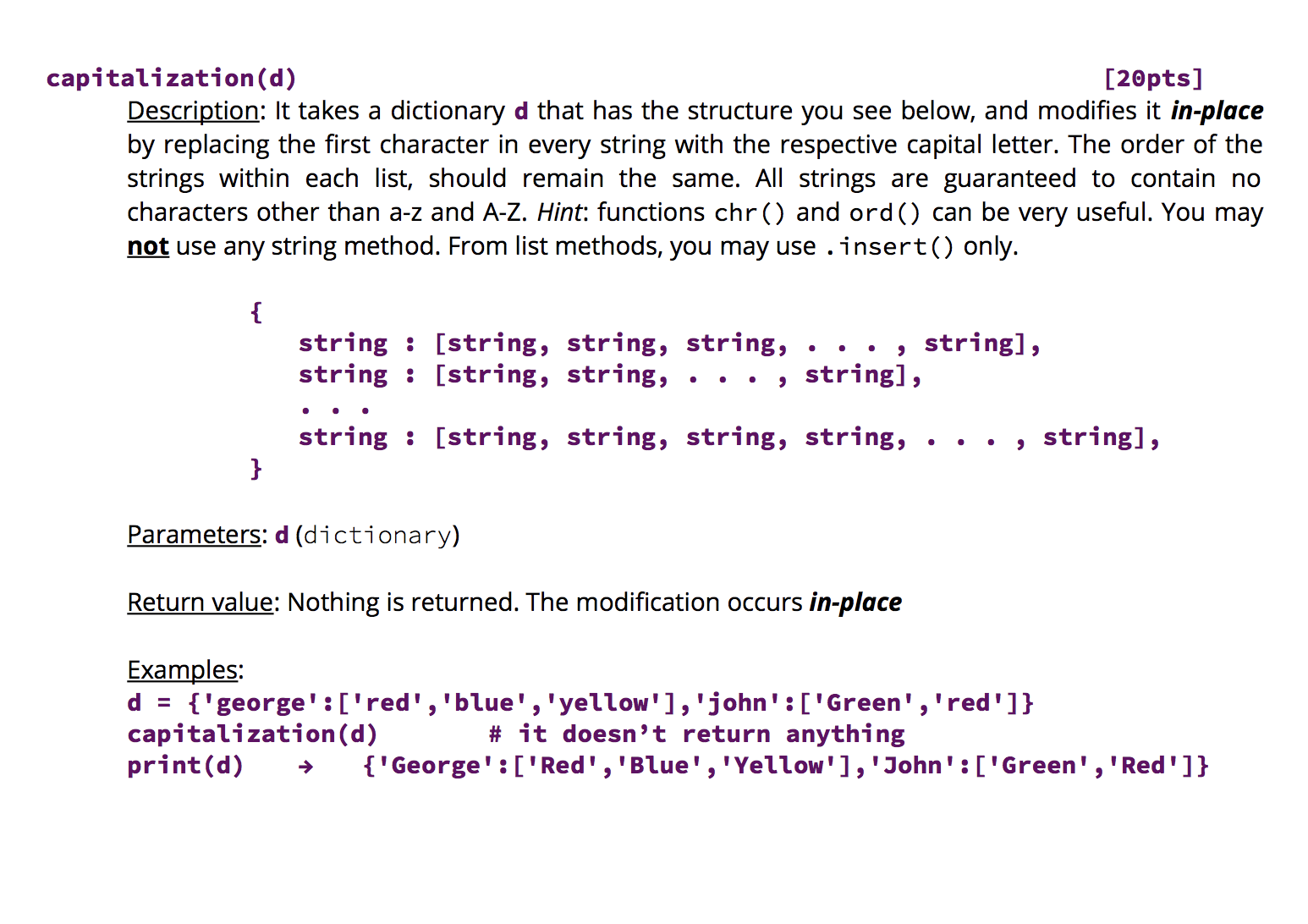can you help in providing the code for these 5 functions please?
Functions The signature of each function is provided below, do not make any changes to them otherwise the tester will not work properly. The following are the functions you must implement: index(d) [lepts] Description: It takes a dictionary d that represents a book index with the structure you see below (keys are words that appear in the book and values are lists of page numbers that these words appear in), and returns a new dictionary where the key is the page number and the value is the set of words that appear in the respective page. { string : [int, int, int, . . . , int], string : [int, int, . . . , int], string : [int, int, int, int, . . . , int], } Parameters: d (di ct-i onary) Return value: a new dictionary Examples: d = {'the':[1,3,7,14],'where':[5,7],'after':[3,14]} index(d) -> { 1:{'the'}, 3:{'the','after'}, 5:{'where'}, 1:{'the','where'}, 14:{'the','after'} merge (d1 , d2) [20pts] Description: It merges two wine inventories represented by dictionaries, di and d2, that have the structure depicted below, and returns the merged dictionary. 'Chardonnay' : {2017:5, 2018:9, 2019:45, 2020:567}, 'Merlot' : {2020:59, 1988:3, 2019:17, 2018:7}, 'Pinot Noir' : {2019:877}, Parameters: di and d2 are dictionaries - key is a string and value is a dictionary where key and value are ints Return value: a new dictionary Examples: d1 = 'Chardonnay' : {2017:5, 2018:9}, 'Merlot' : {2020:59, 1988:3, 2019:17, 2018:7} d2 = 'Chardonnay' : {2017:7, 2019:45, 2020:567}, 'Pinot Noir' : {2019:877} } merge (d1 , d2) 'Chardonnay' : {2017:12, 2018:9, 2019:45, 2020:567}, 'Merlot' : {2020:59, 1988:3, 2019:17, 2018:7}, 'Pinot Noir' : {2019:877}popular_genre (d) [20pts ] Description: It takes a dictionary d that represents a movie database with the structure you see below, and returns a set of movies, the genre of which is the most popular in the database. If two or more genres are equally popular, include all the respective movies in the result. You may not use any lists or list methods. 'Inception' : (2010, {'action' , 'adventure' , 'sci-fi' }), 'The Departed' 'Se7en' .. (2006, {'crime' , 'drama' , 'thriller'}), 'Interstellar' (1995, {'drama' , 'crime', 'mystery' }), : (2014, {'adventure', 'sci-fi', 'drama' }), Parameters: d (dictionary) - keys are strings and values are tuples of (int, set of strings) Return value: a set of movies Examples: # in the following, the most popular genre is 'drama' d = { 'Inception' : (2010, {'action' , 'adventure' , 'sci-fi'}), 'The Departed' : (2006, {'crime', 'drama', 'thriller'}), 'Se7en' 'Interstellar' : (1995, {'drama', 'crime', 'mystery' }) , : (2014, { 'adventure' , 'sci-fi' , 'drama' }) , } popular_genre(d) {'The Departed' , 'Se7en' , 'Interstellar'} # in the following, the most popular genres are 'drama' and 'crime' d = { 'Inception' 'The Departed' : (2010, {'action' , 'adventure', 'sci-fi'}), : (2006, {'crime' , 'drama', 'thriller'}), 'Se7en' 'Interstellar' : (1995, { 'drama' , 'crime', 'mystery' }), : (2014, {'adventure' , 'sci-fi', 'drama' }), 'Ocean \\'s Eleven' : (2001, {'crime' , 'thriller'}), } popular_genre(d) { 'The Departed' , 'Ocean's Eleven', 'Se7en', 'Interstellar' }subset (group, total) [20pts] Description: Creates and returns the smallest subset of group that has a sum larger than total. If there are more than one subsets of equal size that satisfy the above condition, it selects the one with the largest sum. If there is no subset that satisfies the above condition, it returns False. You may not use lists, tuples, strings, or dictionaries, and you may not modify the parameter group either. Parameters: group is a set of positive ints and total is a positive int Return value: a new set Examples: subset ( {6, 2, 7, 3, 4, 1,5}, 15) {5,6,7} # sum=18 # {3,6,7} and {4,6,7} are equally small subsets but their sum is smaller than 18 subset( {6, 2, 7,3, 4,1, 5}, 28) Falsecapitalization(d) [20pts] Description: It takes a dictionary d that has the structure you see below, and modifies it in-place by replacing the first character in every string with the respective capital letter. The order of the strings within each list, should remain the same. All strings are guaranteed to contain no characters other than a-z and A-Z. Hint: functions chr () and ord ( ) can be very useful. You may not use any string method. From list methods, you may use . insert ( ) only. string : [string, string, string, . . . , string], string : [string, string, . . . , string], string : [string, string, string, string, . . . , string], Parameters: d (dictionary) Return value: Nothing is returned. The modification occurs in-place Examples: d = { 'george' : ['red' , 'blue' , 'yellow' ], 'john' : ['Green' , 'red' ]} capitalization(d) # it doesn't return anything print(d) { 'George' : ['Red' , 'Blue' , 'Yellow'], 'John' : ['Green' , 'Red' ]}
